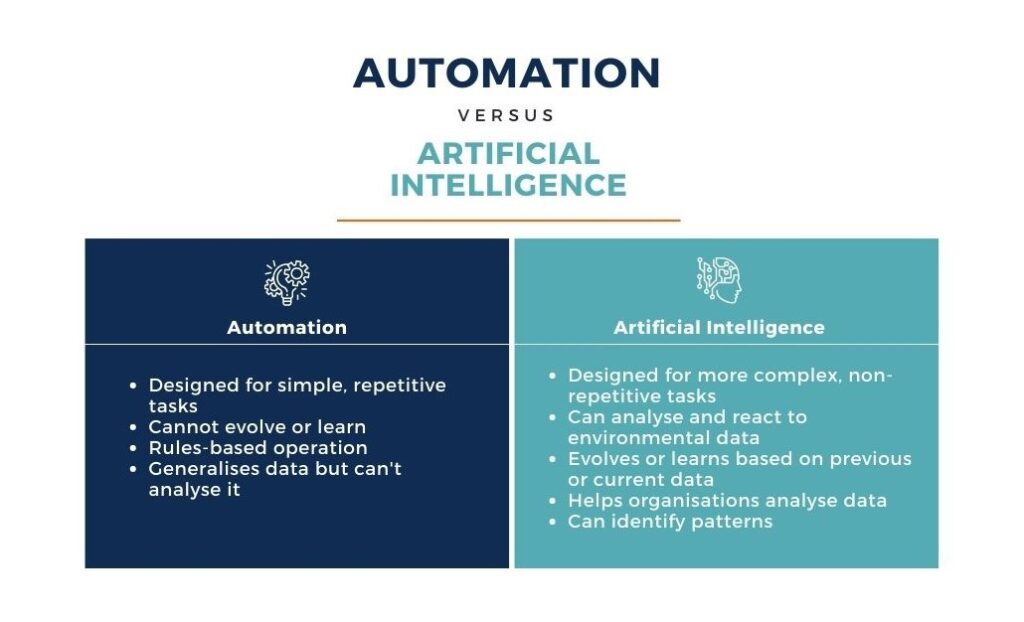Artificial intelligence (AI) is transforming businesses across virtually every industry with promises of improved productivity, growth, and resilience. Just as the internet became integral to business, AI is quickly becoming the most impactful technology of our time. In less than a year, AI-powered capability has morphed from a dystopian future to a helpful companion.
In Bill Gates’s own words, “The development of AI is as fundamental as the creation of the microprocessor, the personal computer, the Internet, and the mobile phone. It will change the way people work, learn, travel, get health care, and communicate with each other. Entire industries will reorient around it. Businesses will distinguish themselves by how well they use it.”
From automation to AI – a breakdown of terminology
As bidding and proposal professionals know, winning and retaining business and securing contracts is not easy. To ease the burden of the tender process and drive efficiencies, over the last few years, companies have increasingly turned to automation to streamline workflows and support collaboration. Automation involves the programming of repetitive, rules-based tasks and activities with reduced human involvement, such as workflow collaboration and approval processes. Automation is a key driver of digital transformation. With advancements in AI, automation can now be extended to more complex and nuanced tasks, from mimicking human behavior (eg. sending an email) to simulating human intelligence (assisting with research).

The biggest benefit of AI-powered processes is the ability to react to new information or unexpected changes. AI algorithms learn from success and failure and are capable of self-correction, and can analyze data to detect incoming challenges before they occur. When you consider that bid and proposal management is grounded in continuous improvement to improve efficiencies and success rates, it has all the attributes to be an ideal candidate for AI.
As bid and proposal professionals, it’s important to understand that AI is a very broad term that encompasses several different technologies. AI refers to any algorithm that exhibits smart behavior. Some of the most commonly used AI technologies include Machine Learning (ML), Natural Language Processing (NLP), and Robotic Process Automation (RPA).
ML involves algorithms that detect patterns in data and use them to make predictions or decisions. For example, ML algorithms can be used to predict customer behavior based on historical data or to optimize bidding strategies based on past performance.
NLP involves algorithms that can interpret, modify, and generate human language. For example, NLP algorithms can be used to analyze customer feedback and identify areas for improvement or to extract important information from bid documents.
RPA involves algorithms that mimic human actions to automate repetitive, simple tasks. For example, RPA bots can track the progress of bids, generate alerts for upcoming deadlines, and send notifications to bid managers when new opportunities arise. This can help ensure that bids are managed efficiently and effectively while minimizing the risk of missing important deadlines or opportunities. It’s important to note that while RPA is often grouped together with AI, it’s generally not considered a form of AI because it doesn’t involve the same level of intelligence and decision-making capabilities.
Generative AI – the next frontier in bid management
More recently, generative AI, powered by Large Language Models (LLM), which has the ability to create original content, information (and even software code) from limited input, has changed the way we interact with applications and how we think about search engines.
Generative AI can also be used to automate more complex tasks that were previously too difficult or time-consuming to automate using traditional AI solutions, such as:
- Text classification
- Question-answering
- Summarisation
- Sentiment analysis
Prominent examples of large language models include Google’s BERT and OpenAI’s GPT series. While they were the first to dominate the market due to enormous financial backing, they are now being joined by a burgeoning ecosystem of emerging players. Most notable is Big Science’s Bloom language model, created and trained in complete transparency by around 1,000 academics and researchers from around the world. Unlike the traditional secrecy of industrial AI research laboratories, the Bloom model will be open source and the first model of its magnitude to be multilingual.
Models trained to specific bid and proposal use cases
Like any models trained on internet data, they’re great generalists but largely poor specialists when solving problems outside of their data distribution. Fine-tuning with domain-specific proprietary data can help ensure that generative AI solutions are accurate and reliable. By training generative AI on this data, it can learn to recognize and account for the nuances and complexities of the organization’s specific domain, leading to more accurate and effective outputs.
Put simply:
Algorithm + Historical Data = Model
Model + New Data = Prediction
This opens up a range of potential use cases for bidding and proposal management – from knowledge management to content generation and insights – presented in a way that is accessible and valuable to the organization.
Example use cases of AI in bidding.
- Research: AI can scan and search previously answered responses, find subject matter experts or key personnel with specific experience, and find new knowledge about a project, person, or company.
- Planning: AI can extract requirements and key themes from the Request for Tender questions and requirements, create outlines, provide compliance checklists, make win theme recommendations, develop a bid schedule based on the tender timeline, and recommend team members and resources for specific bids.
- Qualification and win probability: AI can help to qualify leads and filter out irrelevant ones. It can also help to predict the win rate of opportunities in the pipeline which can provide a framework for early customer engagement and prioritization of activities.
- Strategy and analysis: AI can identify a list of company differentiators, summarise customer preferences and buying habits, provide sentiment analysis based on win/loss feedback, and analyze competitor and historical pricing patterns. By adding AI-powered analytics, bidding professionals can also identify concealed patterns in large volumes of data to provide insights into the behavior and strategies of competitors or the common factors behind win/loss outcomes so that they can adjust their company’s bidding strategies accordingly.
- Writing: AI can rewrite sections, repurpose content for other use cases, generate key personnel biographies and CVs, identify flowery, non-committal, or vague claims, and recommend proof points for improved scoring. It can also automate tasks like idea generation, coherence, and structure, as well as more mundane functions like turning paragraphs into bullet points, reducing word or character count, and ensuring the text is written in the active voice.
Building a Case for AI Implementation
For the last few years, companies have matured their bidding functions by moving previously manual processes to digital formats. This transition has enabled companies to streamline their bidding processes, reduce costs, and increase efficiency – specifically:
AI can:
- help companies scale their volume of bids while reducing the risk of burnout; and
- provide insights into past performance and guide decision-making for future bids.
Digitization is crucial for successful digital transformation, which is essential for fully leveraging AI. Without successful digital transformation, the data required for AI to make informed decisions will be scattered across different systems and databases, making it difficult to access, analyze, and use effectively.
It is essential to consolidate and integrate these disparate data sources into a single, cohesive system to create a foundation that can support AI applications. Failure to do so will result in AI models that are based on incomplete, inaccurate, or inconsistent data, which will lead to suboptimal decision-making and limited value creation.
The first step to leveraging AI in bidding is to build a foundational roadmap. This roadmap should provide a framework for implementing AI across the bidding process and involves having a culture of innovation and experimentation, the right talent, infrastructure, and governance frameworks in place. Key considerations include:
- Having a clear understanding of the business problem you are trying to solve
- Identifying the use cases where AI can add value
- Assessing your organization’s readiness for AI adoption
- Identifying the data available to support AI implementation
- Determining the technical requirements for implementing AI
- Assessing the potential risks and opportunities associated with AI adoption
- Developing robust data management systems and processes to ensure data privacy, security and regulatory compliance.
Successful implementation of AI also requires a culture of continuous learning and improvement, as AI systems must be constantly refined and updated to stay effective.
Conclusion
AI and digital transformation are changing the bidding landscape, and companies must adapt to stay competitive. The potential use cases for AI in bidding and proposal management are vast, including research, planning, qualification and win probability, and strategy and analysis.
By building a foundational roadmap, understanding the difference between automation and AI, and leveraging the power of machine learning, companies can unlock the benefits of AI in bidding to re-imagine every aspect of their work-winning processes.
As the bidding landscape continues to evolve, AI will become an increasingly important tool for companies looking to stay ahead of the curve. But a tool is only as valuable as how it is used to derive and drive sources of value. One of the biggest benefits of AI in bidding is its ability to analyze vast amounts of data quickly and accurately. With AI-powered tools, companies can do more with their data to identify, interpret, analyze, generate, and optimize to improve the efficiency and effectiveness of the bidding process.
AI is here, and it will change the way people work, learn, and communicate with each other, but it won’t likely replace human thinking. It will, however, augment what we do to do our jobs better, and ultimately, it will be up to businesses to distinguish themselves by how well they use it.



Join the Conversation